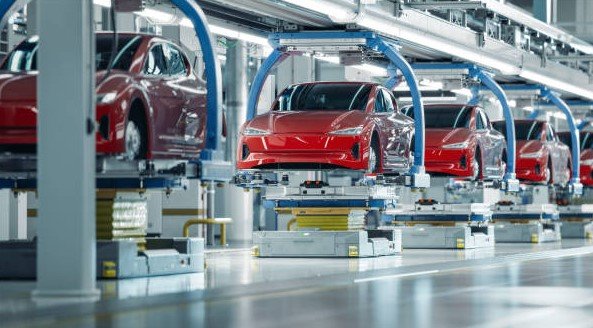Electric vehicle maker Rivian is pushing ahead with its massive $5 billion factory in Georgia after a year-long pause. The company plans to restart construction in 2026, host community events in September 2025, and begin production by 2028, creating thousands of jobs and boosting the local economy.
This move comes as Rivian aims to expand output for its popular SUVs and trucks amid growing demand for electric vehicles. The plant near Social Circle will start with 200,000 units per year, helping the company compete in a tough market.
Project Background and Recent Delays
Rivian first announced the Georgia plant in 2021 as part of its growth strategy. The 1,800-acre site was set to become a key hub for making affordable EVs like the R2 SUV and R3 crossover.
Work began with site preparation, but the company halted construction in March 2024 to cut costs. Instead, Rivian shifted R2 production to its existing Illinois factory to speed up launches and save money during a slowdown in EV sales.
This pause raised concerns among state officials and locals who expected economic benefits. Rivian faced supply chain issues and part shortages, which hurt its stock price and forced tough choices.
Despite setbacks, the project stayed alive thanks to strong partnerships. Georgia offered incentives, including tax breaks and infrastructure support, to lure the factory and its promised jobs.
Funding Boost and Loan Details
A major turning point came in January 2025 when Rivian secured a $6.6 billion loan from the U.S. Department of Energy. This funding is conditional on resuming work, with funds available through September 2028.
The loan will help cover building costs for the 16-million-square-foot facility. Rivian plans to build in two phases, each adding capacity for 200,000 vehicles.
This financial lifeline reflects government support for clean energy jobs. It aligns with national goals to grow domestic EV manufacturing and reduce reliance on foreign suppliers.

Rivian also applied for the loan in October 2024, showing early efforts to get back on track. The approval has boosted investor confidence, though shares remain volatile.
Upcoming Events and Community Impact
Rivian is marking the restart with two events in September 2025. A community gathering on September 14 will engage locals, followed by a formal ceremony on September 16 with Governor Brian Kemp and other leaders.
These events celebrate the partnership and highlight the plant’s role in Georgia’s economy. The factory is expected to create 7,500 jobs by full operation, from assembly line roles to engineering positions.
Local leaders see it as a win for the region east of Atlanta. The plant will bring new roads, utilities, and training programs.
Rivian is also opening an East Coast headquarters in Atlanta later in 2025. It starts with 100 employees and grows to 500, supporting operations and research.
Here are key job benefits expected from the project:
- Direct hires: Up to 7,500 full-time positions by 2030.
- Wage estimates: Average annual salary around $56,000, above local averages.
- Training initiatives: Partnerships with Georgia colleges for EV tech skills.
- Indirect jobs: Thousands more in supply chain and services.
Construction Timeline and Challenges Ahead
Preparatory work like grading and utility setup is already underway. Vertical construction starts in early 2026, with the first phase complete by 2028.
The contractor, Clayco, remains on board, working with engineer Jacobs. The campus will include manufacturing space, testing areas, and green features like solar power.
Challenges include rising material costs and labor shortages in construction. Rivian must navigate these while meeting environmental standards.
The company aims for sustainable building practices, such as using recycled materials and efficient energy systems. This fits its brand as an eco-friendly automaker.
| Phase | Start Year | Production Capacity | Key Features |
|---|---|---|---|
| Phase 1 | 2026 | 200,000 vehicles/year | Main assembly lines, initial job creation |
| Phase 2 | Post-2028 | Additional 200,000 vehicles/year | Expanded facilities, advanced tech integration |
Broader Implications for EV Industry
This restart signals Rivian’s recovery amid industry shifts. Competitors like Tesla and Ford are also ramping up U.S. production, driven by incentives from the Inflation Reduction Act.
EV sales grew 7% in the U.S. in 2025, but adoption varies by state. Georgia’s plant could help make EVs more affordable, targeting prices under $40,000 for models like the R2.
Rivian recently reported quarterly losses but beat revenue expectations. The Georgia expansion is crucial for scaling up and turning profits.
Experts say this project could inspire more investments in Southern states, known for auto manufacturing. It ties into recent events like the Biden administration’s push for green jobs.
What do you think about Rivian’s comeback? Share your thoughts in the comments and spread the word to fellow EV fans.
